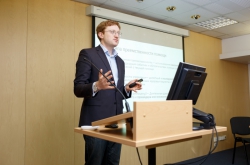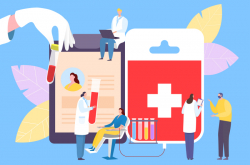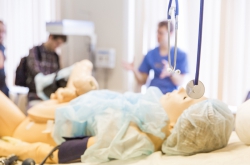Apart from Alexander Boukhanovsky, the other winners of the Government of Russian Federation Award in Education were Daria Kozlova, Vice Rector for International Relations, Maksim Buzdalov, Associate Professor of the Computer Technology Department, Maria Skvortsova, Dean of the Faculty of Higher Qualification Expert Training, and Professor Peter Sloot from the eScience Research Institute.
The goal of the program is to train specialists who are capcable of a multi-disciplinary approach and can solve problems and lead innovative projects and companies in translational IT.

Translational information technology refers to the use of standard IT techniques for non-standard solutions for different projects in fields other than IT. An example of this is the work conducted between ITMO University and Federal Almazov North-West Medical Research Centre. Together, they have created a scientific and educational cluster called "Translational medicine". The main objective of the cluster is to implement information systems in medicine and healthcare infrastructure of the city to expedite processes and improve the efficiency of the system overall.
There are quite a number of fields that require effective information systems, such as urban or social studies. For example, ITMO University’s TROIKA: Technology and Research on Information-Driven Knowledge Alliance, analyses people’s behavior in critical situations, modeling the occurrence and development of such situations and makes predictions based on Big Data. In the field of urban studies at the University we are engaged in, for example modeling the movement of traffic flows and people during peak hours. This allows us to calculate the optimal loading for certain transport hubs of the city and to make an effective route map.
ICT Excellence is aimed at training specialists for such tasks as described, but also offers a number of methods for recruiting talented young people into programs from undergraduate to postgraduate, as well as, intensive programs and professional development. Thus a participant of ICT Excellence can obtain the required competencies to work with translational IT gradually.

During the first part of their training, participants learn about theoretical computer science and software development. Then, they learn about translational technologies. Master's students are taught to use IT in such fields as urban and social studies, biomedicine and other non-technical fields, and participate in different Double Degree programs. This continues into their PhD programs, during which the young scientists work on individual projects, hone their skills and put knowledge into practice. Intensive training implies that students and young specialists participate in specialized conferences, publish articles in science journals, present reports at open lectures and other events that allow them to exchange experience with their colleagues.
The program primarily focuses on training highly qualified specialists that are capable of conducting detailed analyses and pinpointing relevant problems. What is more, all the parts of the program are implemented in collaboration with universities around the world such as the University of Amsterdam, Nanyang Technological University in Singapore, and other renowned educational establishments. This way, the program's participants can participate in internships in different parts of Europe and Asia and gain experience in conducting research internationally.

The introduction of ICT Excellence at ITMO University in 2013−2015 has already showed great results: the export of the university's educational services to non-CIS countries has increased by six times, the number of publications by master's and PhD students has increased by 4.1 times.
The screening for new students for training in translational IT is conducted at every stage of the program. Attracted talented students after they’ve already completed school is not as effective as working with the best talents during their school years, by conducting special online and offline contests, open lectures, meetings with experts and other similar events. To attract the best Bachelor students to become Master's students, the university's specialists make presentations at conferences, practice-oriented workshops and other events that help promote ITMO's visibility. The screening for international students is conducted in collaboration with ITMO's partner universities from other countries. Potential PhD students are expected to be willing to work on the university’s existing research in translational IT and possess considerable research experience.
We'd like to add that only four teams received the Government of Russian Federation Award this year. Apart from ITMO University, this were the "Complex of Scientific and Methodological Publication for the Higher Psychological and Pedagogic Education within the Context of the Goals of Modern Information Society" project, set of educational and academic publications "Physics, Technology, Equipment and Circuitry of Modern Micro- and Nanoelectronics" and the "Creation of a Set of Educational Supplies for Realization of New Educational Programs in Stomatology" project.










